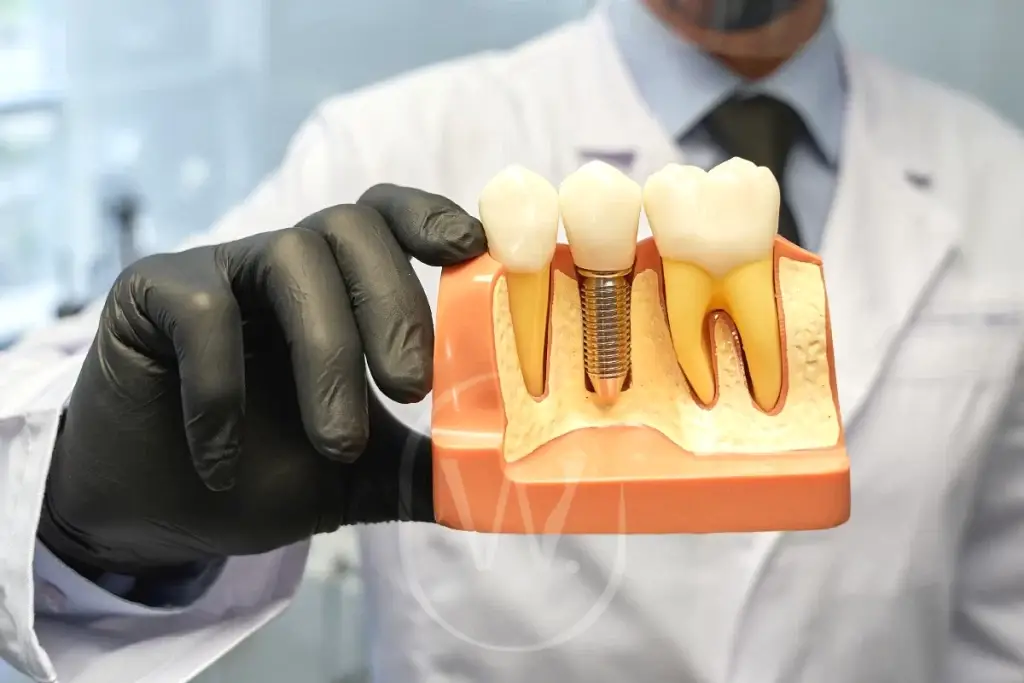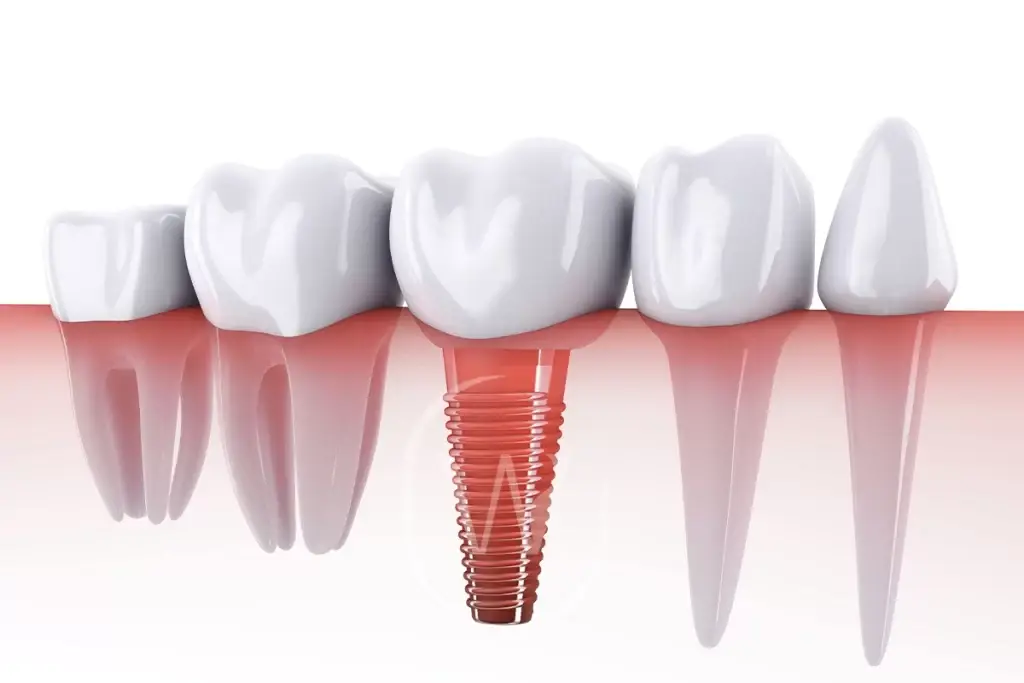Dental implants are a life-changing solution for individuals dealing with missing teeth, providing a long-term and natural-looking alternative to dentures or bridges. If you’re considering dental implants, it’s essential to understand the full process to ensure you feel prepared and confident about your decision.
This guide will walk you through the key stages of the dental implant process, from what to expect before surgery to aftercare and maintenance for long-term success.
Table of Contents
What Are Dental Implants?

Dental implants are artificial tooth roots, typically made of titanium, that are surgically placed into the jawbone to support replacement teeth (crowns). Unlike traditional dentures, dental implants are permanent and offer a solution that looks, feels, and functions like natural teeth. They are ideal for people who have lost one or more teeth due to injury, periodontal disease, or other reasons.
Benefits of Dental Implants
- Durability: With proper care, dental implants can last 15-25 years or more.
- Natural appearance: Implants closely resemble natural teeth in both look and function.
- Improved oral health: Implants help preserve the jawbone and prevent bone loss that typically occurs when teeth are missing.
Before the Procedure: Consultation and Planning

The dental implant journey begins with a thorough consultation and planning stage. Here’s what to expect:
Initial Consultation
During the first consultation, your dentist or oral surgeon will evaluate your overall dental health to determine if you’re a good candidate for dental implants. This evaluation typically involves:
- A full dental exam, including X-rays and possibly 3D imaging.
- Assessing the density of your jawbone to ensure it can support implants.
- Discussing your medical history, including any conditions that could affect healing, such as diabetes or smoking habits.
Preparing for Surgery
If you’re a candidate, your dentist will outline the preparation process. In some cases, additional procedures might be required before the implant surgery:
- Tooth extractions: If the damaged or decayed tooth is still present, it will need to be removed before placing the implant.
- Bone grafting: If your jawbone isn’t thick enough to support an implant, you may need bone grafting to strengthen the area. This adds time to the overall process, as the graft will need to heal before the implant can be placed.
Once these steps are completed, your dentist will schedule the implant surgery.
During the Procedure: Step-by-Step Breakdown

The dental implant surgery itself is a multi-step process that can take several months to complete. Here’s how it works:
Local Anesthesia
To ensure your comfort, local anesthesia or sedation is administered before the procedure begins. This numbs the area where the implant will be placed, allowing you to undergo the surgery with minimal discomfort.
Placing the Implant
- The dentist makes a small incision in your gum to expose the jawbone.
- A hole is drilled into the bone where the titanium post (implant) will be placed. The post acts as the artificial root of the new tooth.
- Once the post is inserted, the gum is stitched closed, and the healing process begins.
Osseointegration (Healing Phase)
Osseointegration is the process where the jawbone grows around the implant, fusing with the titanium post. This phase is critical because it ensures that the implant will be securely anchored in place. It typically takes 3-6 months for the implant to fully integrate with the bone.
Abutment and Crown Placement
Once the implant has healed and integrated with the jawbone:
- The dentist reopens the gum to attach an abutment, a small connector that holds the dental crown.
- After placing the abutment, a custom-made crown is attached. This crown is designed to match the size, shape, and color of your surrounding teeth, ensuring a natural-looking result.
After the Procedure: Healing, Recovery, and Aftercare

Recovery is an essential part of the dental implant process. Here’s what to expect in the days and weeks following your procedure:
Immediate Post-Surgery Recovery
It’s normal to experience some swelling, bruising, and minor discomfort after surgery. Your dentist will provide detailed post-operative care instructions, which may include:
- Taking pain relievers or anti-inflammatory medication to manage discomfort.
- Applying ice packs to reduce swelling.
- Eating soft foods for the first few days to avoid putting pressure on the implant site.
- Avoiding smoking and alcohol to promote healing.
Long-Term Aftercare
Once your dental implant has healed and the crown is placed, maintaining good oral hygiene is crucial to ensure the longevity of your implant. Long-term care involves:
- Routine dental check-ups: Regular visits to the dentist will ensure that the implant remains healthy and functional.
- Brushing and flossing regularly to prevent plaque buildup.
- Avoiding habits like grinding your teeth, which can put unnecessary pressure on the implant.
Following these steps will help ensure that your implant lasts for many years, offering a permanent solution for your missing teeth.
Potential Risks and Complications
While dental implants have a high success rate (95% or higher), like any surgical procedure, there are potential risks. These can include:
- Infection: This can occur at the implant site if post-surgery care is not followed properly.
- Implant failure: In rare cases, the implant may fail to fuse with the jawbone, leading to implant failure.
- Nerve damage: Placing implants in the lower jaw carries a small risk of nerve damage, which can cause numbness or pain.
How to Minimize Complications
To reduce the risk of complications:
- Follow your dentist’s aftercare instructions closely.
- Practice good oral hygiene.
- Attend follow-up appointments to monitor the healing process.
How Long Do Dental Implants Last?

One of the main benefits of dental implants is their durability. With proper care, dental implants can last anywhere from 15 to 25 years or even longer. Several factors contribute to the longevity of your implants, including:
- Oral hygiene: Regular brushing and flossing help prevent gum disease, which can affect the stability of your implants.
- Lifestyle choices: Smoking, grinding your teeth, or poor oral hygiene can shorten the lifespan of your implants.
- Regular dental visits: Routine check-ups allow your dentist to monitor the health of your implants and address any potential issues early.
Are Dental Implants Right for You?
Dental implants are an excellent solution for many people with missing teeth. However, not everyone is a suitable candidate. You might be a good candidate for dental implants if you:
- Have one or more missing teeth.
- Have a healthy jawbone that can support an implant.
- Are in good overall health.
- Don’t smoke or are willing to quit during the healing process.
Cost of Dental Implants: What to Expect
The cost of dental implants can vary based on several factors, including:
- The number of implants required.
- Additional procedures (e.g., bone grafting).
- Your location and the experience of your dentist. Dental insurance may cover part of the cost, but it’s essential to check with your provider beforehand. Many dental practices also offer financing options to help make the procedure more affordable.
Conclusion: A Lifetime Investment for a Confident Smile
Dental implants are a long-term solution for missing teeth, offering durability, natural appearance, and improved oral health. Understanding the process from consultation to recovery helps you feel confident and prepared for the procedure. If you think dental implants are the right choice for you, consult with your dentist to take the first step toward restoring your smile.
Ready to explore dental implants?
Contact us today to schedule your consultation and learn more about how dental implants can transform your smile.




